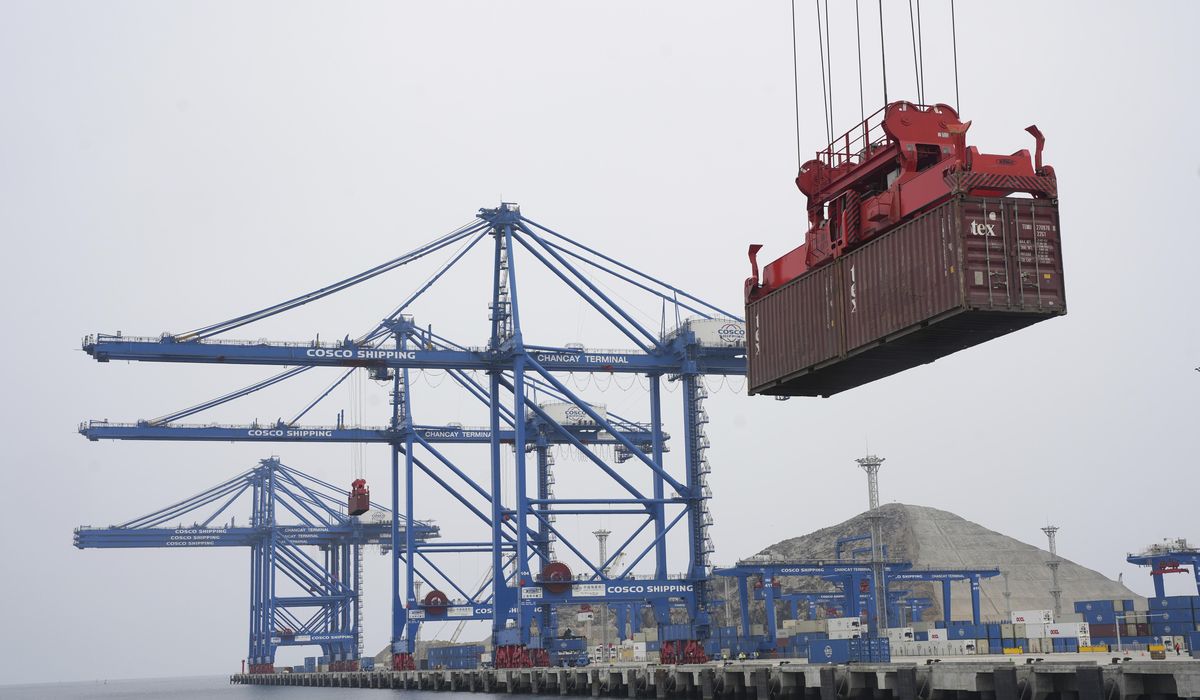


China’s extensive network of commercial ports near the U.S. poses significant security threats, a panel of analysts told a House hearing on Tuesday.
Former intelligence and Defense Department official Matthew Kroenig said control of port facilities by Chinese-owned interests in the Western Hemisphere constitutes a significant security concern.
“Washington and regional states should work together to decouple from Chinese investments in ports and other areas critical to national security,” Mr. Kroenig told the House Homeland Security subcommittee on transportation. The danger is comprehensive and is carried out by China in the economic, technological, diplomatic, ideological and military spheres, he said.
Chinese-managed port facilities at either end of the Panama Canal are also facilitating the shipment of deadly fentanyl into the U.S., said Mr. Kroenig, now with the Scowcroft Center.
“China could restrict or block access to ports, threatening American trade and economic well-being in the event of a crisis or war,” Mr. Koenig warned. Control over the ports also hinders the passage of naval vessels that could disrupt U.S. war plans, he added.
The hearing followed recent comments by President Trump saying China has effectively taken control of the Panama Canal and that the U.S. plans to take it back. Secretary of State Marco Rubio also warned Panama’s president earlier this month that the U.S. will “take measures necessary” to end China’s influence and control over the waterway.
Isaac Kardon, a China analyst with the Carnegie Endowment for International Peace, said China’s port network in the Western Hemisphere could one day be used for People’s Liberation Army naval forces, but that so far U.S. officials have seen limited warship visits to the region. The major danger is China’s use of the ports for intelligence gathering and surveillance, or the disruption of shipping operations in a crisis through Chinese-origin software or equipment, he said.
U.S. officials have warned that the Chinese software called Loglink, used widely for port cargo control, could also be used in spying or sabotage.
Huawei Technologies, a Chinese telecommunications firm the U.S. has accused of electronic spying through its equipment, also has gear at Chinese ports that pose security risks. Chinese ship-to-shore cranes also have been identified by American security officials as capable of conducting intelligence collection or sabotage.
Mr. Kardon played down the use of military forces in the region. A total of 39 PLA navy ships visited ports in North and South America out of a total of 413 ship visits between 1997 to 2024. None have taken place since 2018, he said.
“However, the Chinese-invested ports in [Los Angeles-Long Beach], Seattle, Houston, and Miami are not plausible platforms for any aggressive or otherwise unapproved PLA operations (except in all likelihood for intelligence collection and surveillance),” Mr. Kardon said adding that the risks include cyber disruptions or other operations short of warfare.
Chinese companies hold stakes in ports in seven nations in the Western Hemisphere, including terminals at ports in L.A., Long Beach, Seattle, Houston and Miami. Hong Kong’s CK Hutchison Holdings runs the ports at the canal. China’s other regional ports are in Peru and Brazil.
Ryan C. Berg, a Latin America affairs analyst with the Americas Program, told lawmakers that more than half of China’s 130 ports around the globe are located on major shipping lanes and strategic chokepoints.
“The PRC’s military-civil fusion strategy creates risks for both soft commercial espionage and hard security risks in a potential conflict,” Mr. Berg said.
A Beijing national security law requires all Chinese overseas entities to be ready to conduct espionage, he said. The Pentagon’s Southern Command has said that the danger from Chinese ports includes potential electronic GPS jamming, naval blockades and weapons systems disguised in shipping containers, Mr. Berg added.
Subcommittee Chairman Carlos A. Gimenez said China’s presence in the Western Hemisphere is one of the most pressing national security threats facing the country.
“Through state-owned enterprises such as China Merchants Port Holdings, Hutchison Port Holdings, and China Ocean Shipping Company, the Chinese Communist Party has secured access to some of the most strategically significant ports in our region,” said Mr. Gimenez, Florida Republican.
New Jersey Rep. LaMonica McIver, the panel’s ranking Democrat, said that China has engaged in aggressive port investment and must be countered, but that one of Mr. Trump’s own confidants presents security challenges of a different kind.
“Scrutinizing PRC investments in our ports only goes so far if we are at the same time opening the front gates of our government to Chinese influence,” she said. In addition to ports, she added, China has invested in “foreign assets, including their top puppet — Elon Musk.”
Describing the billionaire entrepreneur as “the de facto president of the United States,” Ms. McIver said Mr. Musk, head of Mr. Trump’s unofficial Department of Government Efficiency, has acted at every turn in the interest of China and at the expense of the American people.
• Bill Gertz can be reached at bgertz@washingtontimes.com.
